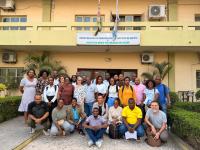In a historical declaration, G20 ministers commit to reducing inequalities
Gathered in Rio de Janeiro, the G20 Development Ministers issued the "G20 Ministerial Declaration on Development to Reduce Inequalities". The document is the result of intense debates since Brasil took over the presidency of the international forum in December. It was received by Brazil's Foreign Minister, Mauro Vieira, and reflected the participation of several countries and international organizations.

The declaration represents an important milestone in the G20 countries' commitment to countering global inequalities and promoting sustainable development for all. The G20 had not been able to approve joint ministerial declarations for two years, as Minister Mauro Vieira reported. "Since the beginning of the conflict in Europe in February 2022, the G20 had not been able to approve ministerial-level documents, which hampered the group that brings together the world's 20 largest economies in its ability to advance the international agenda. During the current Development Ministerial Meeting, the G20 issued two ministerial decisions with full consensus. This represents a victory for Brazilian diplomacy and the Brazilian G20 presidency, showing the importance of having a balanced foreign policy with credibility among its peers," he celebrated.
Minister Mauro Vieira also reaffirmed Brasil's commitment to the 2030 Agenda for Sustainable Development, emphasizing the country's absolute priority in eradicating poverty. He addressed the growing issue of global inequality, referencing data from Oxfam Brasil, a Brazilian non-profit civil society organization. The data reveals that wealth and carbon emissions are concentrated among the richest countries. According to the data cited by Vieira, the world's richest 1% has accumulated almost two-thirds of all wealth generated since 2020. Additionally, the richest 10% are responsible for half of the planet's carbon emissions. "If we had to sum up our challenges in a single word, it would be inequality. Inequality is at the root of these phenomena or acts to aggravate them," he stated.
In the Ministerial Declaration, recognizing the importance of the 2030 Agenda for Sustainable Development and its 17 Sustainable Development Goals (SDGs), the ministers stressed that inequalities are the source of many global challenges. They reaffirmed their commitment to implementing the 2030 Agenda fully and effectively, with a special focus on SDG 10, which aims to reduce inequality in all its forms and dimensions.
The statement also highlights that multidimensional crises, such as the COVID-19 pandemic, climate change, biodiversity loss, and economic crises, have widened global inequalities. In 2022, around 712 million people lived in extreme poverty, 23 million more than in 2019, with children being disproportionately affected. The ministers reaffirmed that eradicating extreme poverty is essential for sustainable development.
The challenges include growing debt vulnerability, food insecurity, stagnant access to health services, and energy markets volatility, which affect the developing countries in particular. The declaration emphasizes that all people, especially the most vulnerable, must have access to essential services, decent work, and economic opportunities.
The ministers committed to promoting social, economic, and political inclusion, guaranteeing equal opportunities and eliminating discrimination. They underscored the importance of international cooperation and the role of local governments in implementing the SDGs, in line with the commitments of the 2016 and 2023 G20 Action Plan.
The declaration also recognizes the importance of policies that promote equal opportunities and empower people in vulnerable situations. The ministers highlighted the need for universal social protection and strengthening health, education, and food security systems. Furthermore, they emphasized the importance of gender equality and the empowerment of women, with the creation of a Women's Empowerment Working Group under the Indian presidency of the G20.
The ministers reiterated that policies to reduce inequalities are essential to ending hunger and structural poverty. The ministers are counting on the launch of the Global Alliance against Hunger and Poverty, proposed by Brazil, as an instrument to support and accelerate efforts in this direction. The declaration also emphasizes the need for specific policies for people in situations of vulnerability, guaranteeing access to essential services and promoting inclusion.
The formula of the agreement proposed by Brasil
According to Brasil's Ambassador and Sherpa Mauricio Lyrio, who coordinates the Sherpas Track, Brasil managed to apply a formula that has been used successfully in other diplomatic negotiations. The process consists of the Brazilian presidency of the G20 issuing a statement on geopolitical issues, which allows ministerial statements to be issued normally without being dependent on the conclusion of a geopolitical text. "It worked so well that, for the first time in two and a half years, we were able to issue two ministerial declarations which, when published, will include the declaration from the Presidency as an attachment. This was the solution we used, and it goes for every working group meeting, regardless of the track," he explained.
Lastly, the ministers reaffirmed the importance of a rules-based multilateral trading system and emphasized the need to mobilize adequate funding for sustainable development. They highlighted the critical role of international development cooperation and the importance of inclusive digital transformation in boosting sustainable growth and reducing inequalities.
Minister Mauro Vieira also highlighted the creation of Sustainable Development Goal 18, introduced by President Lula at the 2023 UN General Assembly, which aims to achieve ethnic and racial equality in Brazil. National initiatives reinforcing the country’s commitment to the SDGs include Bolsa Família and the Brazil Without Hunger (Brasil Sem Fome) Plan.
Minister highlights the fight against inequality and racism during G20 speech
Brazil's Minister for Racial Equality, Anielle Franco, took part in the opening of the second day of the Development Ministerial Meeting. She highlighted inequality as the root of social problems with the potential to exacerbate violence. The minister presented information showing the persistence of racial and economic disparities, underscoring the 400% increase in the number of Black students in higher education between 2010 and 2019.
Anielle Franco concluded by emphasizing collective action to address poverty and inequality, and reinforced the Brazilian Government’s commitment, under the leadership of President Lula, to work tirelessly to build a fairer and more inclusive future. "Fighting inequality, which is the main goal of this working group, is also the main strategy adopted by the Brazilian Government. This is not a coincidence. We know that inequality not only is among the main roots of other social issues but it also acts to exacerbate them. If we don't address it, we'll be making futile efforts and acting irresponsibly towards those who have brought us this far," she declared.



